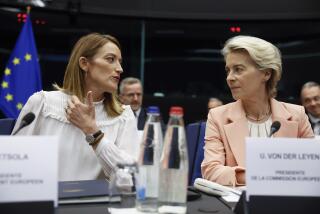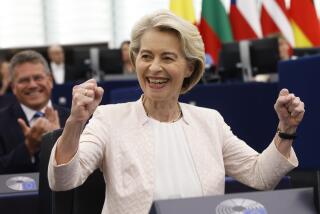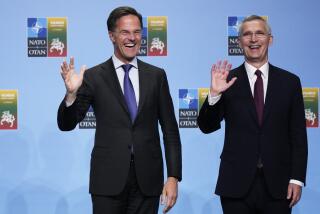EC Official Sees a Crisis in the Community
- Share via
Martin Bangemann, 57, is a vice president of the European Community’s Commission and the most senior German in the EC bureaucracy. His main job is supervising the creation of the single European market.
In an interview last week in Bonn, he discussed the Danish referendum vote that rejected the Maastricht Treaty on European unity.
Question: What do you see as the longer-term effects of the Danish referendum result?
Answer: I do not belong to those who look at the Danish decision as some kind of traffic accident. It is a crisis. It shows there is an underlying crisis of a European dimension, but in the past, the European Community has not only always survived such crises but has come out stronger in the end.
I believe the public debate on European unity after the decision in Denmark will be based much more on fact and judgment than emotion and feelings.
Q. Will events in Denmark feed opposition to the Maastricht Treaty in Germany?
A. I don’t believe so. A majority of Germans remain in favor of the Maastricht Treaty as a whole. With the currency it’s much more tricky, but even here, (it’s) based largely on emotions. When you explain the details of Maastricht, people are convinced it’s a good idea. It is sort of exporting German stability to Europe. But the deutschemark has been a symbol of rebuilding Germany after the war, and Germans don’t want to do away with something that is symbolic of their own existence.
Q. Opinion polls show a generation gap in Germany, with younger people seemingly less committed to the idea of European unity than their parents. Is there a danger that enthusiasm for a united Europe could be seriously eroded by generational change?
A. The European Community was much more “in” with younger people when it was just a vision, a dream that couldn’t be realized. They accused their fathers of not doing enough. Well, now the fathers--who were once those young people--are doing what they dreamed of in their younger days and making the dream into a reality. Europe has entered into the reality of life’s daily problems (and) the new generation has discovered something else. This is normal.
Q. But there is another element to this generational change in Germany: The belief that European unity is important to avoid yet another war is an idea that has strongly influenced the country’s postwar leaders. That idea doesn’t seem to have been handed on to the younger generation of Germans now attaining voting age.
A. That is true and it is based on a fact of political life that you can’t change. If you live in peace, people don’t worry about war. That is the difficulty for politicians who have the experience and memory of war.
Therefore, it is vital that all those who have a political responsibility must carry on the European ideal because it is true: It is the only way that you can ensure peace in Europe.
Q. Germany was disappointed that the Maastricht Treaty did not bring a greater democratization to the European institutions, including transferring power from the non-elected executive Commission to the European Parliament. Former British Prime Minister Margaret Thatcher described the Danish referendum as a triumph of democracy over bureaucracy. Do you agree?
A. That is nonsense. Total nonsense. Mrs. Thatcher never wanted to give more control to the European Parliament. She is a hypocrite.
More to Read
Sign up for Essential California
The most important California stories and recommendations in your inbox every morning.
You may occasionally receive promotional content from the Los Angeles Times.













